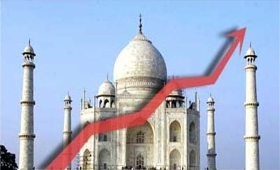|

|
Economy revives in 2010 but inflation, reforms sore points
|
|

|
|
| Top Stories |
 |
|
|
|
Gyanendra Kumar Keshri | 29 Dec, 2010
The year's first three quarters with over 8.5 percent growth marked a revival of the Indian economy in 2010, but the year also ends on a tart note due to high inflation, a virtual status quo on key reforms and allegations of some serious financial scams.
The year evidently started on a positive note when the economy registered 8.6 percent growth in the first quarter, factory output was up around 17 percent in January and exports grew 35 percent in February after 13 months of decline.
Stock markets also regained buoyancy, investments by foreign institutional funds started pouring in again, the appetite for capital goods picked up. But high food inflation of over 17 percent prevented policy-makers from taking steps to ensure more liquidity into the system to help the corporate sector.
"India's growth-inflation dynamics are in contrast to the overall global scenario," Reserve Bank of India Governor (RBI) D. Subbarao said, releasing the annual monetary policy for the fiscal in Mumbai April 20.
"The economy is recovering rapidly from growth slowdown, but inflationary pressures triggered by supply side factors are now developing into a wider inflationary process," Subbarao added, reflecting the dilemma before policy-makers.
Little wonder the apex bank hiked its policy rates as many as six times during the year in a bid to curb inflationary pressures, while also trying to ensure enough liquidity for corporate lending to maintain industrial growth.
As the year draws to a close, the economic growth for the third quarter is an impressive 8.9 percent, exports have expanded by over 25 percent, foreign funds have invested $28.6 billion in equity markets, public issue market has revived and foreign exchange reserves swelled by $11 billion to nearly $300 billion.
"The growth is also broad-based, with recovery in all three sectors -- agriculture, industry and services -- and in consumption and investment," Finance Minister Pranab Mukherjee said earlier this month, expressing confidence of around nine percent growth this fiscal.
This apart, the government has revived its divestment programme, a record number of 13.5 million automobiles have been sold between January and November, and the mobile telecom subscriber base has expanded from around 525 million to over 700 million in 11 months.
But price rise, albeit moderated, remains a major worry. The annual food inflation, for example, which stood at 17.28 percent at the beginning of this year still hovers in the double-digit level at 12.13 percent.
Even on the policy front, the year began on a promising note when the government bit the bullet to its decades-old fertiliser subsidy policy to a more scientific one based on nutrient use, rather than ad hoc doles that experts said had ruined the country's soil health.
This apart, the government earlier this month decided to decontrol petrol prices once again, allowing state-run fuel retailers to fix their own tariffs for gasoline, but shied away from similar measures for other fuels.
Result: There was little headway in policy reforms in other areas, notably on allowing greater private sector and/or foreign equity in areas like defence production, banking, pension and insurance businesses and retail trade.
But what really left industry and people at large worried were allegations of some major scams, especially over allocation of 2G spectrum to telecom companies during the previous tenure of the United Progressive Alliance (UPA) government.
"This creates a period of uncertainty. It affects investment and thus growth," Dilip Modi, the new president of the Associated Chambers of Commerce and Industry of India (Assocham), told IANS. "Corruption is a pain in our society. We have to do away with it."
|
|
|
| |
|
|
|
|
|
|
|
|
|
|
|
|
|
|
| |
| Customs Exchange Rates |
| Currency |
Import |
Export |
US Dollar
|
84.35
|
82.60 |
UK Pound
|
106.35
|
102.90 |
Euro
|
92.50
|
89.35 |
| Japanese
Yen |
55.05 |
53.40 |
| As on 12 Oct, 2024 |
|
|
| Daily Poll |
 |
 |
| Do you think Indian businesses will be negatively affected by Trump's America First Policy? |
|
|
|
|
|
| Commented Stories |
 |
|
|
|
|
|
| |
|